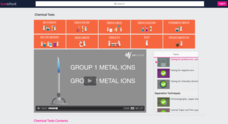Curated Video
Indicator
A substance that provides a visual indication of the pH of a test material. A Twig Science Glossary Film. Key scientific terms defined in just 60 seconds using stunning images and concise textual definitions. Twig Science Glossary Films...
Curated Video
Metal Extraction
We extract copper metal from copper chloride solution using electrolysis. The electric current causes copper to form at one electrode and chlorine gas to form at the other. The presence of chlorine is tested using blue litmus paper....
Curated Video
I WONDER - How Is PH Measured?
This video is answering the question of how is PH measured.
FuseSchool
What Are Structural Isomers
In this video we will look at some different structures of butane - so they all have 4 carbons but just arranged differently. We will also look at the the 5 different isomers for hexane - they all have 6 carbons (and hence are hexane...
Curated Video
Identifying Gases: Tests and Results
The video describes various tests that can be used to identify different gases. The narrator goes through four different gases, hydrogen, oxygen, carbon dioxide, and chlorine, and explains how to identify them. The video goes on to show...
FuseSchool
What Is The pH Scale
"Learn the basics about the pH scale, universal indicator and litmus paper. Indicators tells if something is acidic, alkaline or neutral. Indicators are substances that show different colours when they are in acidic or alkaline...
Curated Video
Identifying Gases: Tests and Results
The video is a tutorial on how to identify four different gases: hydrogen, oxygen, carbon dioxide, and chlorine. The presenter describes the tests that can be used to identify each gas and the results that one would expect. The video...
Curated Video
Simple Chemical Tests for Gases
This video discusses the various tests that chemists use to identify different gases like hydrogen, oxygen, carbon dioxide, chlorine, and ammonia. The presenter demonstrates each test using simple equipment like test tubes, splints, and...
FuseSchool
Indicators
Learn the basics about Indicators, more specifically for acid and bases. An indicator is a large organic molecule that works somewhat like a " color dye". Find out more in this video!
FuseSchool
What Are Indicators & How Do We Use Them?
Learn all about the different indicators used in Chemistry including the universal indicator, litmus in the form of litmus paper, phenolphthalein, and methyl orange.
Curated Video
Acids and Alkalis: Understanding pH and Indicators
The video discusses acids and alkalis, the pH scale, and indicators. It explains what acids and alkalis are in terms of the ions they form when dissolved in water, and how their concentrations can be measured using the pH scale. The...
Visual Learning Systems
Solutions at Work: Acids and Bases
Upon viewing the Solutions at Work video series, students will be able to do the following: Explain that a solution is a type of mixture made of two or more substances that are evenly distributed. Provide an example of a common solution....
Bloomberg
Citi's Rahbari Says Dollar Not Driven by Fed as Two More Cuts Expected
Oct.10 -- Ebrahim Rahbari, global head of FX analysis at Citi, says the dollar has yet to peak in this cycle as he expects two more rate cuts from the Federal Reserve. He speaks on "Bloomberg Surveillance."
Crash Course
pH and pOH
A physicists and a biologist had a relationship, but there was no chemistry. Why is the p in pH lowercase and the H in pOH uppercase? What does the p stand for anyway? These concepts are clearly and...
Fuse School
Testing for the Negative Ions
Polyatomic ions... where do I begin? One of the most difficult concepts for budding scientists to learn and recognize comes to life in an enlightening resource. Show pupils some demonstrations, via the sixth video in a series of 10, to...
Fuse School
Testing for the Positive Ions (Part 2)
How can you tell the difference between chemical compounds, when so many of them are white and powdery? The fifth installment in a series of ten videos exposes learners to flame tests and formation of insoluble compounds as methods...
Fuse School
Testing for Hydrogen, Oxygen, Carbon Dioxide, Ammonia, and Chlorine
How can a chemist tell what gas a chemical reaction produced? Part two of a ten-part series prompts pupils to discover a number of simple tests that can reveal the identity of a gas. The video reinforces the concepts of solubility,...
Fuse School
What Makes Something Acidic?
An informative video provides a definition for an acid, where it falls on the pH scale, and how individuals test for them. It uses many examples with chemical equations.
Fuse School
Indicators
Use a scientific video that begins with types of pH indicators, including pH meters, universal indicators, and litmus paper to explain titration indicators.
Fuse School
What is the pH Scale
Seeing red? If it was blue litmus paper, then it is an acid. Viewers learn about the pH scale through a video that shows how liquids may be tested by litmus paper and a universal indicator.
Steve Spangler Science
Berry pH Paper - Sick Science! #048
Steve Spangler shows how to make your own litmus paper. Using blackberries, construction paper, and water, learners can make their own litmus paper in the classroom. Then, they can take different liquids, such as oil and soapy water, and...








